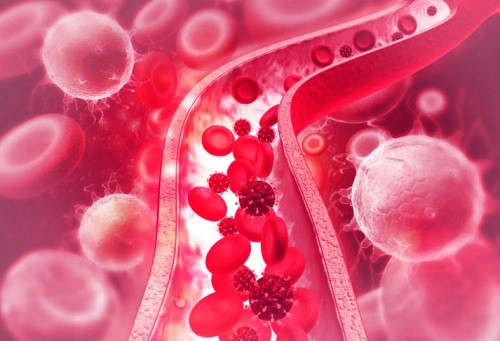Nikhil Prasad Fact checked by:Thailand Medical News Team Aug 11, 2024 8 months, 4 weeks, 1 day, 7 hours, 17 minutes ago
Medical News: How Macrophages Influence Endothelial Cells During Sepsis
Sepsis, a life-threatening condition that arises when the body's response to infection causes injury to its tissues and organs, has long been a challenge for medical professionals. A key factor in sepsis is the dysfunction of endothelial cells, which line the interior surface of blood vessels. Recent research from the Department of Burn Surgery at The First Affiliated Hospital of Naval Medical University, Shanghai, China, has shed light on the critical role that macrophages, a type of white blood cell, play in this process. This
Medical News report delves into these findings, making the complex mechanisms of sepsis more accessible to everyone.
 Macrophages play a role in causing endothelial cell dysfunction in sepsis
The Connection Between Macrophages and Endothelial Cells
Macrophages play a role in causing endothelial cell dysfunction in sepsis
The Connection Between Macrophages and Endothelial Cells
Endothelial cells are essential in maintaining the integrity of blood vessels, regulating the passage of materials and white blood cells into and out of the bloodstream. During sepsis, these cells undergo significant changes, leading to increased permeability and a higher risk of blood clot formation. This process is heavily influenced by macrophages, which are known for their role in the immune response.
Macrophages are the body's first line of defense against infections, and they are quick to respond to any signs of danger. In the context of sepsis, these cells release a variety of molecules that can profoundly affect endothelial cells. The research team highlights the intricate link between the two cell types, providing a deeper understanding of how sepsis progresses.
How Macrophages Trigger Endothelial Dysfunction
When an infection sets in, macrophages spring into action, releasing molecules such as tumor necrosis factor-alpha (TNF-α), chemokines like CCL2, and reactive oxygen species (ROS). These molecules interact with endothelial cells, causing them to become more adhesive and permeable. This heightened permeability is a hallmark of sepsis, leading to the leakage of fluids into tissues, which can result in organ failure.
The study also explains how the release of these molecules by macrophages leads to the breakdown of the endothelial glycocalyx - a protective layer that lines the blood vessels. The degradation of this layer not only compromises the barrier function of the endothelium but also exposes the underlying cells to further damage and increases the risk of clot formation.
The Role of Adhesion Molecules and Endothelial Permeability
Adhesion molecules, such as selectins and intercellular adhesion molecule-1 (ICAM-1), are upregulated in endothelial cells in response to the inflammatory signals sent by macrophages. These molecules play a crucial role in the immune response by allowing white blood cells to adhere to the endothelium and migrate to sites of infection. However, in sepsis, this process becomes dysregulated, leading to excessive inflammation and tissue damage.
Fur
thermore, the increased permeability of endothelial cells caused by macrophage-derived molecules allows more immune cells to pass through the blood vessel walls. While this might seem beneficial in fighting infection, it can also lead to severe complications. The excessive leakage of fluids from blood vessels into tissues can cause swelling, reduced blood pressure, and impaired organ function - conditions commonly seen in patients with severe sepsis.
Potential Therapeutic Approaches
Understanding the interaction between macrophages and endothelial cells opens up new possibilities for treating sepsis. One potential strategy involves regulating macrophage activity to prevent them from causing excessive endothelial damage. The research team points out that certain molecules, such as microRNAs (miRNAs), can influence the behavior of macrophages, potentially reducing their harmful effects on endothelial cells.
MiRNAs are small, non-coding RNA molecules that can regulate gene expression. In the context of sepsis, some miRNAs have been found to suppress the inflammatory responses of macrophages, which could help protect endothelial cells from damage. For example, miR-164a has been shown to inhibit the TLR4-NF-κB pathway, which is crucial for macrophage activation. By modulating the levels of such miRNAs, it might be possible to reduce the severity of sepsis.
The Importance of Maintaining Endothelial Integrity
The study emphasizes that preserving the integrity of endothelial cells is crucial for preventing the progression of sepsis. Once the endothelial barrier is compromised, the risk of organ failure increases significantly. Therefore, therapies that can protect or restore this barrier are of great interest to researchers.
One approach is to focus on the molecules that maintain the endothelial glycocalyx. For instance, fibroblast growth factor (FGF) has been shown to play a role in glycocalyx recovery. Enhancing the body's ability to repair this protective layer could help mitigate some of the damage caused by sepsis.
Conclusion
Sepsis remains a formidable challenge in modern medicine, but studies like this one are helping to unravel its complexities. The interplay between macrophages and endothelial cells is a key factor in the progression of the disease. By better understanding this relationship, researchers can develop more effective treatments to protect patients from the severe consequences of sepsis.
The study findings were published in the peer-reviewed journal: Biomolecules.
https://www.mdpi.com/2218-273X/14/8/980
For the latest on Sepsis, keep on logging to Thailand
Medical News.
Read Also:
https://www.thailandmedical.news/news/new-hope-for-sepsis-induced-lung-injury
https://www.thailandmedical.news/news/moxifloxacin-shows-promise-in-protecting-against-severe-sepsis
